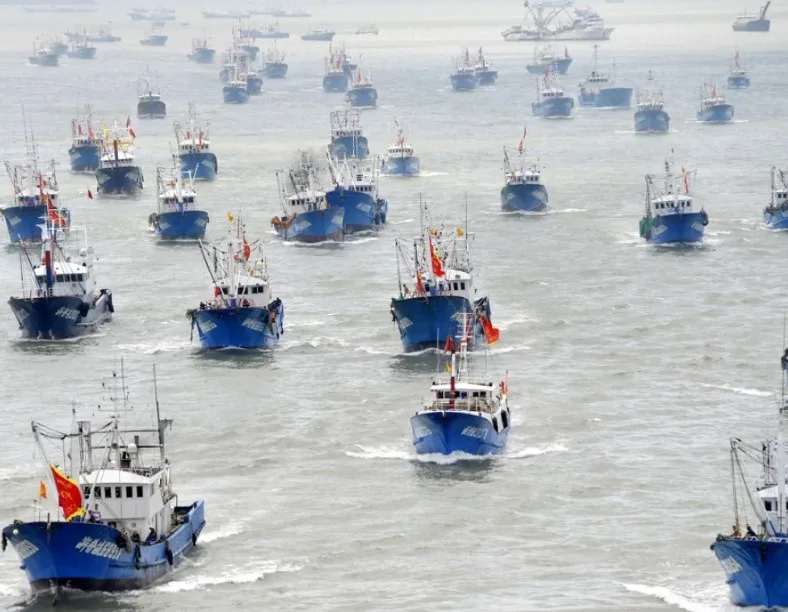Ecuador and Peru lead the international fight against illegal fishing in Pacific Ocean offshore waters
By Julieta Pelcastre
Ecuador and Peru are leading the fight against illegal, unreported, and unregulated (IUU) fishing that the Chinese fishing fleet carries out year-round in Latin America.
Illegal and unreported fishing has decimated fish stocks globally over the last decade. The crime ranks as the sixth largest illicit industry after counterfeiting and drug trafficking and generates huge annual revenues of around $36 billion, representing one in every five fish catches worldwide, according to the Economist magazine.

Some Chinese fishing fleets include hundreds of vessels and are difficult to monitor.
According to the daily, the Chinese fleet controls 80 percent of foreign vessels in South American waters, exacerbating the overexploitation of fishing resources. The fleet also causes heavy annual losses and affects the local fishing economy and the planet’s food security.
About a third of the Chinese fishing fleet, comprising more than 3,000 vessels, catches squid for six months in the South American Atlantic and another six months in the Pacific, near Ecuador, Peru, and Chile, The Economist added. In December, the fleet is off the Ecuadorian coast. In response, countries of the region are implementing measures against this crime.
Ecuador led the response against the Chinese fleet in 2020, when 340 vessels were caught catching vulnerable species south of the Galápagos Islands. Then-President Lenin Moreno pledged to protect the islands and the first step was to demand that China stop these illegal incursions. Peru soon followed suit, The Economist reported.
For the past three years, the Chinese fleet has remained within about 100 kilometers of Ecuadorian and Peruvian jurisdictional waters. Both countries led a regional coalition with Chile, Colombia, Panama, and Costa Rica to tackle IUU fishing by implementing high-tech surveillance and monitoring platforms, the daily added.
The species most affected by illegal fishing are the dorado and tuna in Ecuador, along with the giant squid. Many of these species are exported to other countries, Latin American platform The Food Tech indicated.
In addition, the Partnership for Sustainably Managed Fisheries, a joint interagency agreement between the National Oceanic and Atmospheric Administration (NOAA) and the U.S. Agency for International Development (USAID), supports Colombia, Ecuador, and Peru in their fight against IUU fishing. The partnership seeks to strengthen government capability to implement the Agreement on Port State Measures and promote sustainable management of critical marine species and ecosystems, USAID says.
The United States supports the response in South America with high-tech equipment and sensors. In 2020, the U.S. Coast Guard began patrolling alongside the Ecuadorian Navy. Since 2022, the U.S. State Department has raised nearly $30 million for anti-IUU fishing programs, The Economist reported.
Until the mid-2020s, Peruvian ports were key to serving the Chinese fleet in the South Pacific. In August of that year, Peru introduced a rule requiring additional satellite devices on foreign vessels arriving at its ports to more accurately track routes prior to entry, environmental news site Mongabay Latam reported.
“However, so far in 2023, more than 70 Chinese vessels have entered Peruvian ports without the additional satellite device required by the authorities, thus circumventing the law,” Juan Carlos Sueiro, director of Fisheries of conservancy nongovernmental organization Oceana Peru, says.
According to data from the Peruvian Ministry of Production provided to Mongabay Latam, most of the vessels entered port to change crew, some to renew certificates. There are indications that some of these vessels were in the Callao shipyard.
“China seeks to make decisions in its favor. There is pressure, including from the Chinese ambassador in Lima, to relax the satellite device rule, while the governments of Peru and China discuss the update of the Free Trade Agreement. It is evident that the negotiation is in that area,” Sueiro said.
The U.S. Coast Guard deployed to Peru during Operation Southern Shield 2023, as part of efforts of the countries of the South Pacific Regional Fisheries Management Organization Convention to monitor high seas fisheries and combat IUU fishing, the U.S. Coast Guard said in October.
Just prior to Southern Shield, GALAPEX 2023, a recurring joint, multinational exercise hosted by Ecuador and conducted near the Galápagos Islands, took place. Naval forces from Ecuador, Peru, the United States, and 11 partner nations sought to improve interoperability to neutralize illegal fishing activities, the Ecuadorian Navy said.
“While these naval exercises are not new, they recently adopted a specific focus on interdicting IUU fishing. This addition is crucial, as countries in the region require all possible tools to combat IUU fishing,” Sueiro said.
“These efforts should not only be based on international programs, but also on strengthened cooperation between Peru, Ecuador, and Chile, especially regarding giant squid fishing,” Sueiro added. “China increased its giant squid fishing activities, reaching 400,000 tons. Unfortunately, this number continues to grow every year.”




















